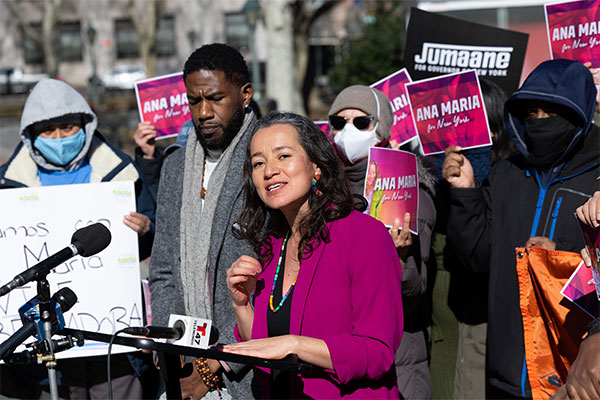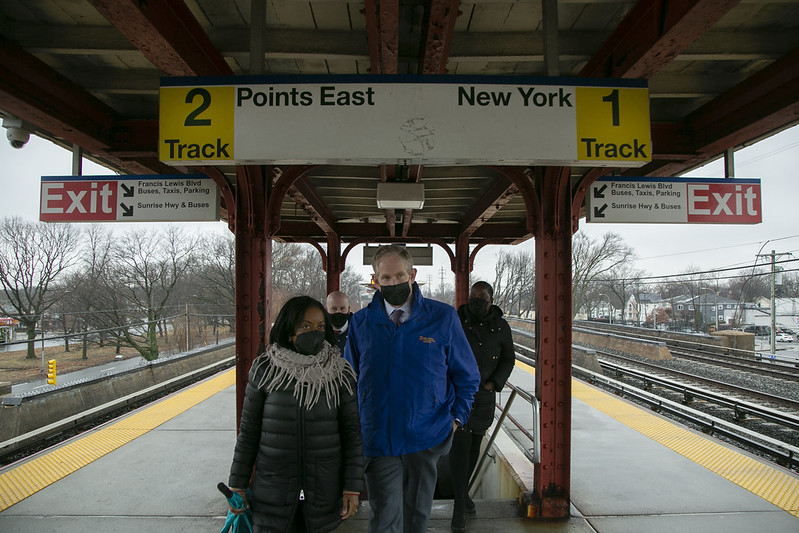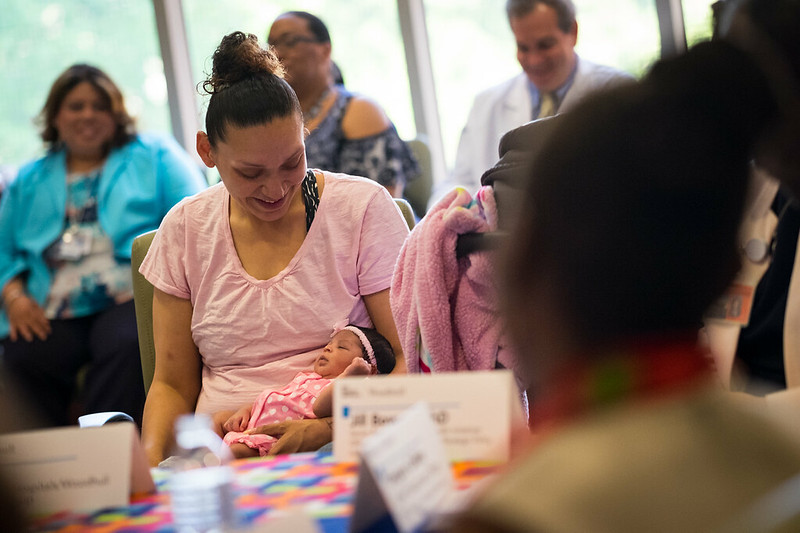This International Women’s Day, Let's Commit to Building a New York Economy That Works for Women

Ana Maria Archila, the author (photo: Claudio Papapietro)
It is said that International Women’s Day, which we celebrate today, March 8, started in 1857 when a group of women garment and textile workers marched in New York City for better wages and working conditions. Though this origin story is probably a myth — in fact, Women’s Day originated with a suffragist march through Manhattan six decades later — its popularity underscores that women’s liberation will only come when we achieve economic justice.
The pandemic made more visible the impossible challenge that women, and our families, face every day trying to balance the duties of care and work in an economy in which affordable childcare, housing, and healthcare are hard to find. At the same time, the pandemic exacerbated gender inequalities and laid bare a fundamental and often ignored truth; the success of our communities relies on the jobs done overwhelmingly by women, especially those of color.
For these women — providing childcare, health care, and keeping their families in their homes, working in restaurants, as street vendors and more — a return to a pre-pandemic “normal” is also untenable. We cannot simply go back to systems that didn’t work. New York must act with urgency and vision to deliver real economic gains for women, and, by extension, all communities.
Across the United States, nearly 2 million women left the workforce during the pandemic. Many have not returned. In New York, unemployment remains well above the national average. A recent report found that women with children in the New York metropolitan region were 70% more likely than men to be staying out of the workforce. According to the same study, women of color have been particularly hard hit, with higher unemployment rates than for white women.
These direct economic harms to women go hand in hand with more insidious forms of violence. In the pandemic’s early months, women were 20% more likely than men to experience hunger. At the same time, intimate partner violence has shot up. Ensuring women’s rights is not solely an economic matter, of course, but the interconnection of all these harms makes clear that economic progress is a crucial piece of the puzzle.
New York can take concrete steps towards addressing these issues, but we need leaders who will prioritize the dignity of women and rise to the occasion. Here’s some of what we can and should do this year:
First, we must pass universal childcare. A recent statewide study demonstrated that our childcare system is broken. Most parents either cannot afford to pay for childcare or live in a community without sufficient access to care services. Meanwhile, childcare providers — most of whom are women — are receiving inadequate wages and struggling to make ends meet. This system serves no one’s interest, least of all women. It is time for New York to step up and deliver a childcare system that works for all.
Second, we need to provide secure housing for all. This year, New York can take a critical step by passing “good cause” eviction legislation, which would stop landlords from evicting tenants who have been paying their rent and limit exorbitant rent increases. In the long term, we must work to transform quality housing into a right for all New York residents.
Third, we must raise workers’ wages and fund excluded workers. Tipped workers in the restaurant industry — a critical source of employment for women — are still not guaranteed the $15 an hour minimum wage. Governor Hochul has failed to lead on this issue. She must stand up for workers and ensure they receive a fair wage.
We should not stop with restaurant workers. We should also boost wages for home care workers — again, primarily women of color — and provide hazard pay to hospital workers.
Our state must also end the exclusion of workers from the state’s safety net by enacting “Excluded No More” legislation as part of the budget. This would replenish the historic, but depleted, Excluded Workers Fund with $3 billion and a permanent system for inclusion, to cover all workers who were left out from other pandemic relief while often doing essential work for our state.
Finally, we must also address gaping chasms in health coverage and care. This year’s budget must include “Coverage for All” legislation that would ensure that all low-income New Yorkers, regardless of immigration status, can access an Essential Plan. New York must also pass the New York Health Act to ensure truly universal access coverage and care.
As the mythical origins of International Women’s Day illustrate, the fight for women’s rights cannot be separated from the fight for economic gains like universal childcare, living wages, and dignified housing. But the mythical, and actual, origin of Women’s Day illustrates something else important too: it all started in New York. It’s time for New York to once again lead the fight for women’s liberation by electing leaders with the courage to fight for our economic rights. The state’s women know that we cannot return to the way things were before the pandemic. It’s time our leaders did too.
***
Ana Maria Archila is a Democratic candidate for Lieutenant Governor. She has been a leader in New York and nationally in the fight for immigrant rights, worker justice, LGBTQ rights, and women’s rights for two decades. On Twitter @AnaMariaforNY.
***
Have an op-ed idea or submission for Gotham Gazette? Email This email address is being protected from spambots. You need JavaScript enabled to view it.
Ensuring Transportation Equity in New York City

Council Member Brooks-Powers, the author (left), with MTA CEO Lieber (photo: William Alatriste/NYC Council)
For too long, New York City’s transportation conversations have focused largely on communities – both geographic and otherwise – that are best able to navigate our city’s streets, sidewalks, waterways, and subways. New York City is now at a pivotal moment where we are seeing historic funding from Washington, D.C. and the first female majority City Council. It is time to reshape the transportation and infrastructure conversation that for too long has left out the outer-boroughs and transportation desert communities.
Transportation equity is a major issue in our city that must be confronted, and I have begun working on it as the new chair of the City Council's Committee on Transportation and Infrastructure. It requires addressing the needs of neighborhoods that have suffered from divestment, long commutes, often in two-fare zones, and a lack of transit access. It also calls for us to make our streets and public transportation ADA-accessible, ensure our children are safe traveling to and from school, promote the use of minority- and women-owned businesses (MWBEs) when we allocate our transportation dollars, and focus on improvement – not just enforcement – when we tackle dangerous driving.
Fundamentally, transportation equity can only be achieved by listening to the needs of all communities, and prioritizing people and places that need our efforts and resources most. To engage in thoughtful dialogue regarding transportation equity citywide, the Council’s Transportation and Infrastructure Committee is taking a comprehensive approach. We held our first oversight hearing on the topic this week, allowing transportation stakeholders to provide their insights. As, Chair, I have also embarked on a transportation and infrastructure listening tour of all 51 Council Districts. I want to talk not only to my Council colleagues and transportation advocates, but also to residents in different neighborhoods about how the City Council can help address their transportation needs.
Many of the challenges my district faces are experienced by neighborhoods across the city, and I’m excited to tackle these issues. It’s also important that we remember how these “citywide” issues disproportionately affect some New Yorkers, and question why that is and what we can do to change it.
One example of this is street safety. All New Yorkers suffer when our streets are unsafe, and no neighborhood is immune to the impacts of traffic deaths and injuries. Yet, a lack of focus and investment, historically from the city government, has left districts like mine – District 31 in Southeast Queens – to experience more traffic deaths than anywhere else in the city, based on data from last year. Much is the same in other districts like mine, from the Bronx to Staten Island. This means more of our friends and families are being hurt and killed on our streets. We need solutions that include addressing historic underinvestment that has left streets in some neighborhoods far less safe.
These disproportionate negative effects are also not limited to issues of street safety. As the data confirms, this also applies to traffic pollution, lack of accessible infrastructure, and other challenges.
As the Chair of the Committee on Transportation and Infrastructure in the New York City Council, I want to make sure that we address these important issues holistically, and our city agencies are responsive to the individual needs of communities. That means taking community input seriously and understanding that one solution may not work for every block in the city.
I am committed to making sure all of our communities’ voices are heard to achieve transportation equity across our city.
***
City Council Member Selvena Brooks-Powers is the Majority Whip of the City Council and represents the 31st Council District, which includes the neighborhoods of Arverne, Brookville, Edgemere, Laurelton, Springfield Gardens, Rosedale, and Far Rockaway. She is chair of the Council’s Committee on Transportation and Infrastructure. On Twitter @CMBrooksPowers.
***
Have an op-ed idea or submission for Gotham Gazette? Email This email address is being protected from spambots. You need JavaScript enabled to view it.
I Had A No-Cost Childbirth, Other New York Moms Should Be Able To Do The Same

A new mom (photo: Edwin J. Torres/Mayoral Photo Office)
When I had my first child, I couldn’t believe how expensive it was to give birth. Thankfully, I had no complications, but the bills related to my brief hospital stay added up and compounded the financial strain of caring for my new baby.
Eighteen years later, I was pregnant with my third child and worried that the costs would again be too high for me to afford. But this time, I was able to participate in the SEIU 32BJ Health Fund’s Maternity Care Program in partnership with Mt Sinai and my experience was a complete 180 from what had occurred nearly two decades earlier.
Every last dollar of my pre- and post-natal care was covered. I didn’t pay a single hospital bill out-of-pocket, which was an enormous relief, both emotionally and financially. My baby and I are happy and healthy, and I can now focus on saving for his future.
Unfortunately, not every New York mom is so lucky.
The Health Fund was spurred to create its Maternity Program in 2020 in response to the alarming statistics about the danger of giving birth in New York. Roughly 20 women die per 100,000 live births in our state every year, a higher rate than the rest of the county, which is already lagging far behind other developed nations in this important category. And it’s especially dangerous for women of color. Black women are more than twice as likely to experience life-threatening complications during or after childbirth and eight times as likely to die from pregnancy-related deaths.
Even when a pregnancy is routine and without complications, having a baby is still incredibly expensive – and the cost can vary widely depending on where you live, according to a New York State Health Foundation analysis. This is another reason why 32BJ’s no-copay Maternity Program is so important and beneficial to working moms.
It seems logical that a program with a proven track record and the potential to save lives should be expanded and replicated throughout the five boroughs so more mothers like me can benefit. But NewYork-Presbyterian (NYP), one of the city’s largest hospital systems, has threatened the program’s very existence. NYP wanted the Fund to either end the program to eliminate competition from other area facilities or allow NYP to offer it without guaranteeing to meet the high-quality standards that make the program so special.
A new piece of legislation introduced in Albany, the Hospital Equity & Affordability Law (HEAL), will help rein in out-of-control hospital prices and curb the anti-competitive contracting practices employed by hospital executives that block access to innovative care like the Maternity Program. When passed and signed into law, HEAL will enable the Health Fund to expand access to the program and establish a blueprint for other self-insured funds to follow at hospitals across the state.
At a time when new parents should be celebrating and bonding with their newborns, too many are instead worried about how to pay for their hospital bills. Giving birth and caring for an infant is stressful enough. More moms should be able to enjoy this life-changing experience like I did – without having to pay a single cent toward the highest-possible quality care.
It is far past time for the state to do everything possible to improve outcomes for moms and babies – especially moms of color, who face unnecessary and life-threatening challenges when giving birth in New York. Making HEAL a law would be a good first step. I hope state lawmakers and the governor act during this legislative session, so more mothers can get the kind of care they both need and deserve.
***
Shaunte Turner is a member of 32BJ SEIU and works in the cleaning division at Madison Square Garden.
***
Have an op-ed idea or submission for Gotham Gazette? Email This email address is being protected from spambots. You need JavaScript enabled to view it.




